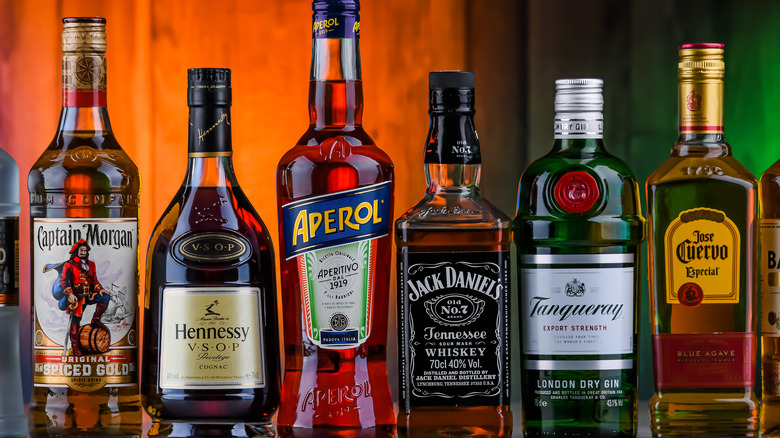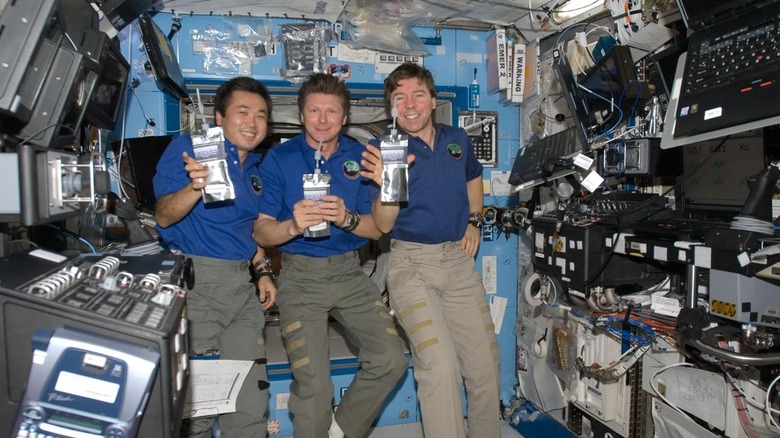The Reason Why Astronauts Can't Have Alcohol In Space
Many people of legal drinking age like to enjoy an alcoholic beverage from time to time, whether it's to celebrate a special occasion or unwind after a long day at work. But if that long day at work involves being an astronaut on the International Space Station... alcohol is off limits.
From a practical perspective, it makes sense. The world's respective space agencies don't want their highly trained employees going on a bender and messing up a vital space experiment or damaging any multi-million dollar equipment. Let's be honest; no one wants an intoxicated astronaut at the helm of a $150 billion space station rocketing through space at over 17,000 mph.
Not that the ban on booze has stopped astronauts from sneaking it into space and enjoying a cosmic cocktail. In fact, back in the 1980s, the Russian space agency included cognac in cosmonaut's rations because doctors said it helped stimulate the immune system. Once they dropped the sickle and hammer on liquor, though, the cosmonauts found ways to smuggle it on board in hollowed-out books and mislabeled juice bottles. Some even went on crash diets to fit bottles in their spacesuits.
In space... no one can drink alcohol
NASA has been far more strict, but it wasn't always that way. It let Buzz Aldrin drink communion wine during man's collective first trip to the moon in 1969. Charles Bourland, former director of NASA's space food program, said he tried getting sherry on the menu for the Skylab space station back in the 1970s. In the end, it didn't make the cut because of public backlash, and the "no alcohol" rule was put into place.
While NASA has since banned alcohol, in the 2019 book "Alcohol in Space" by Chris Careberry, astronaut Clayton Anderson revealed that "NASA will tell you there is no alcohol aboard the ISS. As a person who lived there for five months, I'll tell you that's bogus."
Both beer and whiskey have been sent into space to see what effect zero gravity had on the brewing process and aging. Bubbles of carbon dioxide (aka "carbonation") can't rise to the top of the liquid, so instead, they remain randomly spread throughout the beer, which results in a foamy mess. The lack of gravity slowed down the aging process in the whiskey, making it taste like smoked fish, rubber, antiseptic-tinged smoke, and other unpleasant things (via Men's Journal).
Another interesting fact about beer's unsuitability in space was also discovered. Since there is no gravity in space, the carbonated liquid doesn't settle in the bottom of the stomach, and the gases remain at the top, so astronauts make "wet burps." According to NASA spokesperson William Jeffs, this is why all carbonated beverages are excluded from the space menu (via New Scientist).
Off-gassing is and isn't exactly what you think it is
Aside from the obvious safety issues, there are some very sound scientific reasons that alcohol isn't allowed. Ethanol, the main ingredient in alcohol, is considered a "volatile compound" that could cause damage to the delicate equipment (like the water recovery system) found in the tight confines of the ISS or other space-faring enclosures.
Any product containing alcohol, whether in perfume, aftershave, or mouthwash, can't go into space either. Moreover, astronauts can wear only clothing made from 100% cotton. Cans under pressure (e.g., shaving cream or hair spray) and handheld video games are also banned, all because of something called "off-gassing."
According to NASA, many familiar, ordinary, everyday objects either give off a smell or emit an odorless gas. We don't pay much attention to it here on Earth because if something stinks, we can simply open a window to expel the noxious odor. Guess what you can't do on the ISS or a rocket ship? Exactly. In space ... no one can crack a window. Long-term exposure to radon and carbon monoxide can cause severe health issues. Without the ability to expunge trapped gasses and bring in the fresh air, the climate within the ISS is strictly regulated and maintained.
Cheers (just not in space)!

